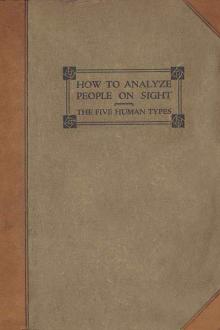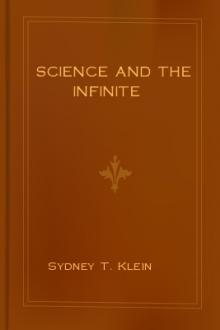How to Analyze People on Sight - Elsie Lincoln Benedict (e novels for free .txt) 📗

- Author: Elsie Lincoln Benedict
- Performer: -
Book online «How to Analyze People on Sight - Elsie Lincoln Benedict (e novels for free .txt) 📗». Author Elsie Lincoln Benedict
How to Deal with this Type in Business
¶ Don't employ this man for heavy manual labor or where there is more arm work than head work. Give him mental positions or none.
If you are dealing with him as a tradesman, resist the temptation to take advantage of his impracticality and don't treat him as if you thought money was everything.
Remember, the chief distinguishing
marks of the Cerebral, in the order
of their importance, are the HIGH
FOREHEAD and a PROPORTION
ATELY LARGE HEAD FOR THE
BODY. Any person who has these
is largely of the Cerebral type no
matter what other types may be
included in his makeup.
etermine which type PREDOMINATES in a subject.
If there is any doubt in your mind about this do these four things:
1st. Note the body build—which one of the five body types (as shown in Charts 1, 3, 5, 7, 9) does he most resemble? (In doing this it will aid you if you will note whether fat, bone or muscle predominates in his bodily structure.)
2nd. Decide which of the five typical faces his face most resembles.
3rd. Decide which of the five typical hands his hands most resemble.
4th. If still undecided, note his voice, gestures and movements and they will leave no doubt in your mind as to which of these types comes first and which second.
Having decided which type predominates and which is second in him, the significance of this combination is made clear to you by the following law:
¶ The type PREDOMINATING in a person determines WHAT he does throughout his life—the NATURE of his main activities.
The type which comes second in development will determine the WAY he does things—the METHODS he will follow in doing what his predominant type signifies.
The third element, if noticeable, merely "flavors" his personality.
Thus, a Cerebral-Muscular-Alimentive does MENTAL things predominantly throughout his life, but in a more MUSCULAR way than if he were an extreme Cerebral. The Alimentive element, being third down the list, will tend to make him eat and assimilate more food than he otherwise would.
and Should Not Marry
Each Other
am so sorry to hear the Browns are being divorced. I have known George and Mary for years and they are as fine a man and woman as I ever saw. But they just don't seem able to get along together."
How many times you have heard something like this. And the speaker got nearer the truth than he knew. For the Georges and Marys everywhere are, on the whole, fine men and women.
¶ Each one is all right in himself, but merely married to the wrong person—a fact we have recognized when both George and Mary made successes of their second ventures and lived happily ever after.
Human happiness, as we have noted in the introduction to this volume, is attained only through doing what the organism was built to do, in an environment that is favorable. Marriage is only the attempt of two people to attain these two ends individually, mutually and simultaneously.
¶ Now, since it is almost impossible for one to achieve happiness when untrammeled and free, is it to be wondered at that so few achieve it in double harness? For the difficulties to be surmounted are doubled and the helps are halved by the presence of a running mate.
¶ That "two can live on less than one" is not true—but it is nearer the truth than that two can find ultimate happiness together easier than either can find an approximation of happiness alone.
This is not saying that any one who is unmated can have happiness as complete as that which comes to the rightly mated—for nothing else in life can compare with that—but they must be RIGHTLY MATED, not merely married.
No one who has observed or thought on this subject will deny that it is a thousand times better not to be married at all than to be married to the wrong person.
¶ Surveys of the causes for divorce during the past ten years in the United States have revealed some startling facts—facts which only prove again that Human Analysis shows us the truth about ourselves as no science has ever shown it to us before.
One of the most illuminating facts these surveys have revealed is that only those men and women can be happy together whose natures automatically encourage each other in the doing of the things each likes to do, in the way each likes to do them.
Inborn inclination determines the things every human being prefers to do, concerning all the fundamental activities of his life, and also the manner in which he prefers to do them. These inborn inclinations, as we have previously pointed out, are written all over us in the unmistakable language of type.
When we know a man's type we know what things he prefers to do in life's main experiences and how he prefers to do them. And we know that unless he is permitted to do approximately what he wants to do in approximately the way he prefers, he becomes unhappy and unsuccessful.
¶ These biological bents are so deeply embedded in every individual that no amount of affection, admiration, or respect, or passion for any other individual suffices to enable any one to go through long years doing what he dislikes and still be happy. Only in the first flush of infatuation can he sacrifice his own preferences for those of another.
After a while passion and infatuation ooze away. Nature sees to that, just as she sees to their coming in the first place. Then there return the old leanings, preferences, tendencies and cravings inherent in the type of each.
¶ Under this urge of his type each reverts gradually but irresistibly to his old habits, doing largely what he prefers to do in the ways that are to his liking. When that day comes the real test of their marriage begins. If the distance between them is too great they can not cross that chasm, and thereafter each lives a life inwardly removed from the other.
They make attempts to cross the barrier and some of these are successful for a short while. They talk to and fro across the void sometimes; but their communings become less frequent, their voices less distinct, until at last each withdraws into himself. There he lives, in the world of his own nature—as completely separated from his mate as though they dwelt on different planets.
¶ "But how is one to know the right person?" you ask. By recognizing science's recent discovery to the effect that certain types can travel helpfully, happily and harmoniously together and that certain others never can.
¶ Every individual owes it to himself to find the right work and the right mate, because these are fundamental needs of every human being.
Lacking them, life is a failure; possessing but one of them, life is half a failure.
To obtain and apply the very fullest knowledge toward the attainment of these two great requisites should be the aim of every person.
¶ Despite the fact that these are the most vital problems pertaining to human happiness and that every individual's life depends for its glory or defeat, joy or sorrow upon the right settlement of them—they are two of the most neglected.
¶ Our divorce courts are full of splendid men and women who are there not because they are weak or wrong, but because they stepped into nature's age-old Instinct trap without realizing where it would lead them.
These men and women who pay so heavy a price for their ignorance and blindness are not to blame. Most of them have been taught that to be legally bound together was sufficient guarantee of marital bliss.
But experience has shown us that there are certain kinds of people each individual can associate with in harmony and that there are those with whom he could never be happy though a hundred ministers pronounced them mated for life.
¶ But the time is coming when we will select our mates scientifically, not merely sentimentally. It is also coming when we will know what every child is fitted to do by looking at him, just as we know better today than to set a shepherd dog on the trail of criminals or a bloodhound to herd sheep.
¶ Instead of beclouding the significance and the sanity of life's great quest; instead of encouraging every manner of mismating as we do today, we will some day arm our children with knowledge enabling them to wisely choose their life work and their life mate.
¶ The fact that Dolly has a dimple may make your senses whirl but it is not sufficient basis for marriage. There are things of vastly greater importance, though of course this does not seem possible to you at the time.
¶ And though Sammy sports a smile the gods might envy, he may not be the right man for Dolly. Even a smile that never comes off, great lubricator that it undeniably is, is not sufficient foundation for a "till-death-do-us-part" contract.
¶ When we hear of a divorce we assume that it was caused by the inability of those two people to agree upon fundamentals. We suppose that they found within themselves wide divergences of opinion, feeling or attitude regarding really worth while questions—social, religious, political or economic. We are inclined to imagine that "the little things" should take care of themselves and that only the "big things" such as these should be allowed to separate two lives, once they have been joined together.
¶ Yet the exact opposite is what happens, according to the divorce records of the United States.
These records show that divorces do not arise out of differences in what we have always called the big things of life, but out of those things which we have always called the little ones.
¶ We do not expect a husband or wife to change his religion and take on his partner's faith. We imagine this is an inherent thing more or less deeply imbedded in him and not to be altered, while we consider it only fair and right for John to give up his favorite sport, his hobby and some of his habits for Mary's sake.
At the risk of shocking the supersensitive, it must be admitted that most individuals get their religious leanings from external sources—parents, teachers, ministers, friends and especially by the accident of being born in a certain country, among a certain sect or within a certain community.
On the other hand, one's preferences in the matter of diversions are born in him, part and parcel of his very being and remain so to the end of his life. Accordingly, just as it is easier to change the frosting on a cake than to change the inside, it is easier to change a man's religion than to change his activities.
¶ Most of the divorces granted in America during the past ten years have been demanded, not on grounds dealing with the so-called fundamentals, but for differences regarding so-called unimportant things. And more than seventy out of every hundred divorces every year in this country are asked for on grounds pertaining to diversion.
In other words, more than seventy per cent of American divorces are granted because husbands and wives can not adapt themselves





Comments (0)